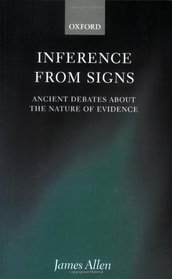Search -
Inference from Signs: Ancient Debates about the Nature of Evidence
Inference from Signs Ancient Debates about the Nature of Evidence
Author:
James Allen presents an original and penetrating investigation of the notion of inference from signs, which played a central role in ancient philosophical and scientific method. Inference from Signs examines an important chapter in ancient epistemology: the debates about the nature of evidence and of the inferences based on it--or signs... more »
Author:
James Allen presents an original and penetrating investigation of the notion of inference from signs, which played a central role in ancient philosophical and scientific method. Inference from Signs examines an important chapter in ancient epistemology: the debates about the nature of evidence and of the inferences based on it--or signs... more »
ISBN-13: 9780199550494
ISBN-10: 0199550492
Publication Date: 9/15/2008
Pages: 304
Rating: ?
ISBN-10: 0199550492
Publication Date: 9/15/2008
Pages: 304
Rating: ?
0 stars, based on 0 rating
Publisher: Oxford University Press, USA
Book Type: Paperback
Other Versions: Hardcover
Members Wishing: 0
Reviews: Amazon | Write a Review
Book Type: Paperback
Other Versions: Hardcover
Members Wishing: 0
Reviews: Amazon | Write a Review




